Learning the value of virtue
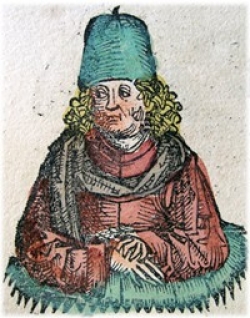
"Education is an ornament in prosperity and a refuge in adversity." - Aristotle, 384-322 B.C. Illustrations courtesy of Beloit College
"You're making good money, but are you making good decisions?"
That's the question ethics professors campus-wide might ask of the 4,105 graduates the University of Cincinnati sent into the "real world" following commencement last month. Already, many of those grads are peering through microscopes, balancing books, arguing cases, educating children, testing products, writing reports, creating art and practicing medicine.
Certainly they left with a brain-load of knowledge and a mastery of their discipline -- years of learning and experience rolled up into a tidy certificate of diploma. But that isn't enough.
Students at UC are expected to go beyond the books and latch onto a set of values, a sense of integrity and a code of professionalism to apply and uphold throughout their career.
So how do professors instill such traits?
First, whether it is science, business, law or medicine, educators agree that issues that require good judgment are never black and white. Matters of ethics and professional dilemmas rarely present themselves as a battleground of good versus evil. Hence the term "dilemma."
A more likely scenario is that of being forced to choose between equally unpleasant alternatives. Therefore, to get students to buy in, faculty first have to get them to grasp the types of complex quandaries they'll likely face.
An accountant wants to take a stand for more accurate bookkeeping in his firm, for example. But by doing so, he risks a promotion and perhaps his job. What should he do? What would you do? The real challenge, professors say, is to train students to recognize "sticky situations" when they surface.
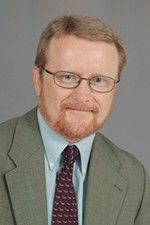
John Bryan, A&S
"Ethical questions come to you in a whisper," says John Bryan, associate professor of English and comparative literature with the McMicken College of Arts and Sciences. "I try to get students to hear that whisper. I spent 10 years working for engineering companies before teaching. I was surprised by the subtlety, the nuances of ethical dilemmas in the workplace. They almost never come up and hit you in the head and say, 'This is a moral crisis in your life.'"
Bryan, who writes a column on ethics for Intercom, a monthly magazine for technical writers, introduces the subject in his business writing courses by presenting his students with scenarios, often from his own experiences.
"The biggest problem is in people even recognizing that there is an ethical dilemma in the first place," he says. "They make very small concessions bit by bit and end up suddenly in a position where they are a far distance from where they thought they would ever come. It is that kind of incremental creeping up that ends up sinking people in the workplace because they don't see it coming."
Bryan describes a situation in which an employer claimed in their advertising to have been ranked among the country's best firms for five of the last 10 years. That was true, but in actuality, the engineering firm hadn't made the list for the last five consecutive years.
"At some point you confront the issue that we may be saying something technically accurate, but creating an impression that is different from the truth," he explains. "Eventually you get to the point where you are saying something that is basically irrelevant."
Through these types of scenarios, he attempts to make ethics real for his students. "If you ask, 'Would you ever lie in the performance of your job?' it would be very easy for them to say, 'Of course not.'"
Instead, Bryan drops students smack-dab in the middle of a hypothetical scenario in which they are newly employed after a long layoff with a mortgage due and children to support. A sister office in New York is bidding for a contract in Saudi Arabia and requests the resume of an impressive vice president. The problem is this: That VP has been dead for years, and the sister office knows that. What would you do?
"I don't presume to teach students moral truths," he says. "I try to raise their awareness of the ethical questions that surround them and make them aware that those questions are being asked."
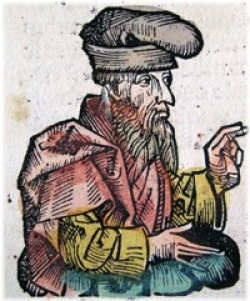
"But if you ask what is the good of education in general, the answer is easy: that education makes good men and that good men act nobly." -- Plato, 428-347 B.C.
Every discipline at the University of Cincinnati faces similar issues of professional integrity. And professors at UC seem to meet them head-on.
"Intellectual capability, critical knowledge, the ethical dimension, the value system -- that's what education should instill and not just how do we get a job," says Manfred Wolfram, head of electronic media at the College-Conservatory of Music. "It has to go far beyond that. To be an enlightened citizen means I bring to the table a questioning mind."
That's why media ethics is required of electronic media students. "The majority of students wouldn't necessarily choose it, but we feel it is essential to confront them with issues," Wolfram says. "Then we discover that they are very open to it, very forthright in their thinking."
Virtue 101
As to the classic question of whether integrity and morals can be taught, College of Law emeritus dean Joseph Tomain defers to the great philosophers. "Can goodness be taught? Ask Aristotle," Tomain says.
"I mean you sort of have to go back to the Greeks on this issue. Certainly Aristotle thought this was something that was worthy of discussion. It strikes me that one really ought to reflect on this topic, and the failure to do so is probably a failure to lead the good life. And that's straight Plato."
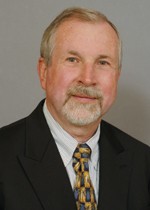
Manfred Wolfram, CCM
Not unlike the assertion of both Aristotle and Plato that "goodness" should be the aim of education, Tomain asserts that professionalism should be a key aim of the law school. "Literally from day one, we hope to convey the message that once you enter these portals, you have to be reflective about what it means to become a professional," he says.
"That requires a certain sensitivity to values, a sense of your own competence and a sense of your own professionalism. Through regular opportunities for students to reflect on this development of their professional character, hopefully it will take."
To be sure it takes, the college attempts to expose students to positive role models who are lawyers, judges and scholars. The college endorses an academic honor code that states: "… good moral character is a prerequisite for admission to the bar and practice of law; individual personal integrity is essential in all aspects of a law student's life, whether law school related or not." The college immerses students in such efforts as the Urban Morgan Institute for Human Rights, the Lois and Richard Rosenthal Institute for Justice and the Center for the Study of Ethics and Contemporary Moral Problems.
Tomain points to Watergate as the watershed event that prompted the American Bar Association to require formal legal ethics courses. In addition to the bar, today's graduates have to pass the Multistate Professional Responsibility Exam, plus brush up with regular ethics training once in practice.
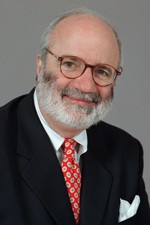
Joseph Tomain, law
"I like to think of the 'good lawyer' as somebody who observes the legal ethical obligations and acts professionally," he says. "Lawyers have an ethical obligation to represent their clients zealously, but you can't file frivolous lawsuits. A professional lawyer would be somebody who returns phone calls, cares about their client and pays attention to their client's desires. Professionalism is a broader idea that goes beyond our minimum duties and attains a sense of respect and dignity in which the lawyers of the highest esteem are held."
The hope is, after three years in law school, graduates emerge with a better sense of themselves.
"I hope they take away a sense that thinking about and reflecting on professionalism is an important part of who they are as individuals and as lawyers," Tomain says. "If you continue to do that, and you get the small things right, you may get the big things right, too."

"There is only one good, knowledge, and one evil, ignorance." -- Socrates, 469-399 B.C.
Perhaps no field is as ripe with ethical questions as that of medicine. Dr. Christine McHenry is director of medical ethics for the University of Cincinnati College of Medicine. In her courses, she covers a multitude of issues: Assisted dying, human embryonic stem cells, medical mistakes, boundary issues, professionalism and the importance of values -- to name a few.
"My goal over the years with this course has been to challenge students to look at their own values," she says. "I'm not there to inculcate them with some set of values they must uphold. I want them to understand themselves."
Dr. McHenry has plenty of practical experience upon which to draw and pass along to her students. She is also chairwoman of the ethics committee at Cincinnati Children's Hospital Medical Center. The committee serves as a recommending body not only for doctors, nurses and hospital staff, but also for patients and families.
"Twenty years ago, ethics questions were mostly related to end-of-life issues," McHenry says. "We still get some of those, but it really could be anything today. We get questions related to the refusal of recommended therapy based upon faith. And it is not just Jehovah's Witnesses. We get some who say, 'My faith says prayer alone will cure me.' "Often we are in these sticky situations. We have to talk to the patient, the family and the health-care team. We have to have the facts before we can render a recommendation. And still, the ultimate decision lies with the doctor and the patient."
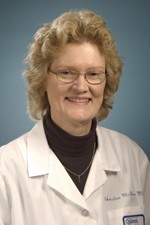
Christine McHenry, medicine
At times McHenry has found herself defending both sides of an issue.
"The ethics committee had a case where we were asked if it was morally acceptable to withdraw life support from a child," she says, "and we said two things: It would be morally acceptable based on the ethical values in the case. It would also be morally acceptable to continue life support based on the ethical values in the case. Good people of moral integrity can be on opposite sides of these issues."
McHenry reminds her students in class that they will soon be on the wards and making decisions that will affect lives.
"If I can provide them a means for analyzing a sticky situation, they will have something to hold onto," she says. "I try to pick topics they will face. I have had students come back and say, 'At the time, I didn't realize how important that ethics course was. Now I realize it was the most important course in medical school.'"
Chances are all of UC's grads this year will face a professional dilemma during their careers. Some probably already have. There is no way of knowing how many will make good decisions, but at least they were trained to know the value of virtue.
Ethics test: What would you do?
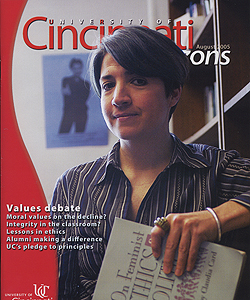
 Past Issues
Past Issues